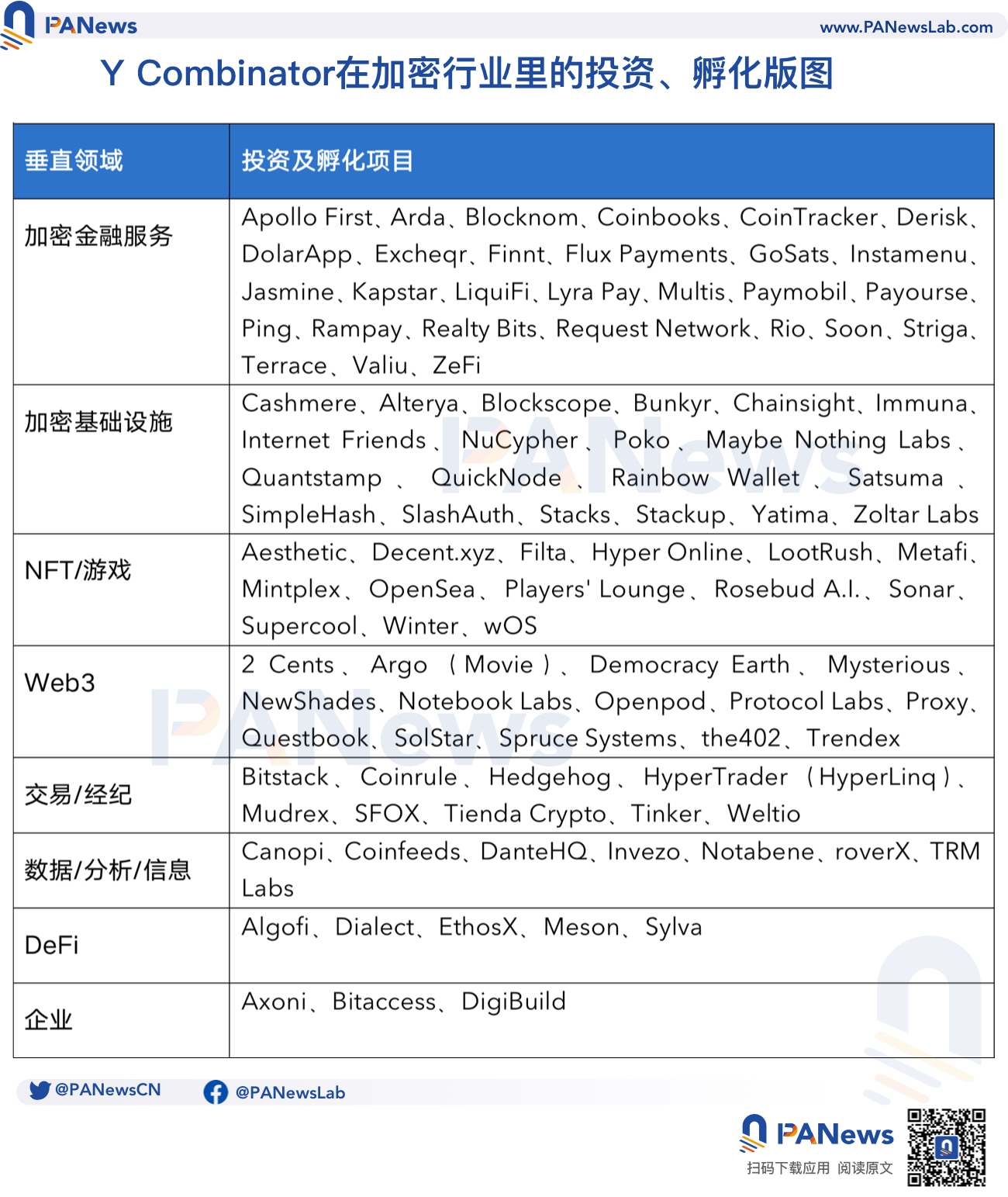Low-key crypto industry planner, Silicon Valley incubator Y Combinator is optimistic about stablecoins, the metaverse, and AI
Author: Jordan, PANews
Compared to well-known investment institutions in the crypto industry like a16z, Paradigm, and Binance Labs, Y Combinator, while not focused solely on the crypto sector, is undoubtedly one of the most low-key "players" in the crypto industry. Behind Coinbase, OpenSea, TRM Labs, Quantstamp, and even WorldCoin, you can find its presence.

Last week, Y Combinator released its annual "Requests for Startups" report. Unlike previous years, this year Y Combinator explicitly pointed out that stablecoins, the metaverse, and artificial intelligence (AI) will be the most promising areas for innovation in the future: stablecoins have huge potential as an economically efficient cross-border payment option, while Y Combinator also sees prospects in augmented reality (AR) and virtual reality (VR), with metaverse applications beginning to extend beyond gaming; at the same time, AI is now capable of customizing enterprise software and streamlining "back-office processes."
Why does Y Combinator favor the stablecoin economy?
In the words of Y Combinator partner Brad Flora, "Stablecoins will become an important part of the future of currency." In fact, Y Combinator has been effectively incorporating stablecoins into its operations for years, including cross-border payments, reducing transaction costs and fraud, and helping users protect their savings from hyperinflation. Many have previously thought that blockchain technology lacked practicality, while stablecoins are precisely the simplest and most efficient application of blockchain technology, leading traditional finance to inevitably "imitate."
First, historical trends suggest that the stablecoin market is at a breakthrough stage. Y Combinator has observed signs of rapid development in stablecoins, with one of the most typical examples being PayPal's recent launch of its self-issued dollar stablecoin, PYUSD, while major banks have also begun to offer custody services and ramped up their promotional efforts. All these changes are very similar to the transformation of the digital music industry in the early 2000s, when the MP3 market seemed rife with "illegal" shared downloads, but began to get on track with the entry of "legitimate players" like Apple and Spotify.
Second, there is still significant room for growth among stablecoin users. On a data level, the global issuance of stablecoins is currently around $136 billion, which holds enormous development potential, as only about 7 million people have traded/used stablecoins so far, while over 500 million people live in countries and regions with inflation rates exceeding 30%. This means there is substantial depth and growth potential for stablecoin users.
Moreover, the technological advantages of stablecoins are clear, but the number of BUIDLers is insufficient. Y Combinator hopes to find and invest in promising teams. Stablecoins are digital currencies that tie value to an anchor (usually the US dollar, but it could also be other fiat currencies or assets). Stablecoin transactions are recorded on a blockchain digital ledger, allowing any two wallets on the same network to transact and complete transactions within seconds, with transaction fees significantly lower than traditional financial transfers. These technological advantages are quite evident, but currently, the number of BUIDLers focused on building stablecoin technology is very limited, with only a few issuers like Tether and Circle, and the main market liquidity providers can be counted on one hand. Therefore, Y Combinator aims to find excellent teams building B2B and consumer products on top of stablecoins, tools, and platforms, as these tools and platforms themselves can enable stablecoin finance and more stablecoin protocols. As of now, Y Combinator's alternative investment portfolio in stablecoins includes:
- Stablecoin payment service provider Apollo First
- Stablecoin cross-border payment service provider Kapstar
- Stablecoin payment Web3 application Paymobil
- Stablecoin protocol Algofi based on the Algorand blockchain
- L2 Rollup low-cost stablecoin cross-chain trading platform Meson, etc.
Why does Y Combinator favor the metaverse and AI?
With Apple and Meta successively releasing the Apple Vision Pro and Meta Quest 3, the metaverse market has reignited. Y Combinator partner Diana Hu pointed out that although augmented reality (AR) and virtual reality (VR) are continuously evolving, there are still many challenges to address regarding best use cases and best user experience/user interface practices. Diana Hu added:
"User experience is getting better, rendering capabilities are continuously improving, and hand/eye tracking has significantly improved— but there is still work to be done."
Therefore, if startups explore applications based on metaverse devices in areas like "super games," they are likely to be included in Y Combinator's investment radar.
At the same time, enterprise software built with artificial intelligence, large language models (LLM), and "understanding AI" also appeared in Y Combinator's "Requests for Startups" report. Y Combinator managing director Harj Taggar believes that compared to traditional "one-size-fits-all" enterprise software, AI can help companies create their own customized customer relationship management, human resources, and planning systems. Large language models can significantly simplify many "back-office processes" historically executed manually by "large teams," including application assessments, document submissions, transaction monitoring, and compliance reviews.
The following chart shows Y Combinator's relevant investments in AI since 2015, clearly indicating that the number of its investment projects in AI has significantly increased since the launch of ChatGPT:

Data shows that in the Winter (January-March) and Summer (June-August) batches of 2023, the number of AI-related projects reached 88 and 99, respectively. In addition to the increase in the number of investments, compared to the Winter batch of 2023, Y Combinator is paying more attention to application landing projects in enterprise services and software development, with AI applications becoming more diverse, and the number of AI investments related to healthcare services and financial projects has significantly increased. Currently, Y Combinator seems to be more focused on projects that utilize AI technology to enhance development efficiency, such as:
- CodeStory, which supports automatic code writing;
- Tempo Labs, which can generate 60%-80% of the front-end code needed for any function;
- Autotab, which provides ZTool tools that can automatically generate corresponding programs based on natural language description instructions;
- Ten.dev, which generates comment files for code and supports developers in querying through chat;
- Kapa.ai, which provides AI-supported robots for the programming community;
- Magic Loops, which supports writing computer programs in natural language, etc.
Conclusion
In the venture capital circle, there are not many institutions that have a more significant positive impact than Y Combinator. Today, this old and low-key incubator has unknowingly made substantial investments in the crypto industry. For anyone with an innovative and entrepreneurial spirit, the significance of Y Combinator is evident. By analyzing and interpreting the areas they focus on, it may provide valuable insights for Web3 entrepreneurs.


























